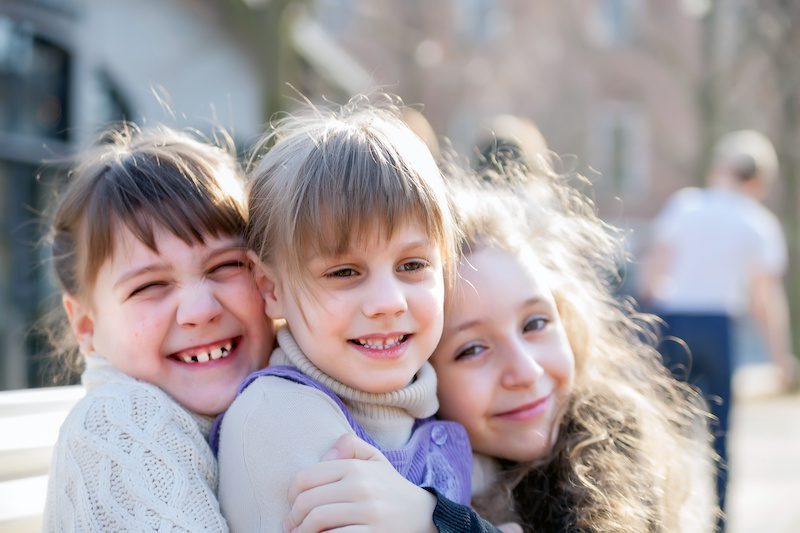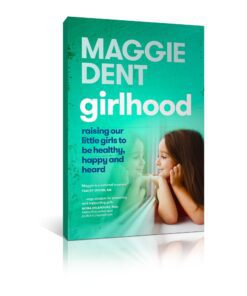Body Safety / Talking Sex, Building Resilience, Newsletter Articles, Posts for Parents, Raising Girls
Helping your Young Daughter Find her Sense of Self

Every child is born as a one-off, unique human being. Given genetic gifts or challenges, epigenetic influences and ancient biological drivers our babies arrive wired invisibly to be themselves, not anyone else. Philosophers, mystics and other wise people have been exploring the search for self for centuries.
“To thine own self be true.”
In today’s tech-saturated and highly sexualised world this search may have become harder especially for our girls. In the most formative years, little girls are being shaped and conditioned to look and be a certain way – and to be in competition with all other girls.
Cultural conditioning and social norms especially around looking nice, or being good, quiet girls or people pleasers have been around for a very long time. I definitely remember those messages!
When these pressures are combined with overt marketing in our consumerist world, can we raise our girls to be who they are meant to be with a brave authenticity?
I believe we can, however, we need to start from the moment they are born.
The formative years of birth to around eight are when everything is shaped – from how they see the world, to how they learn to make predictions from their sensory world, manage their worries and stressors, explore their emotional domain, and grow a healthy body and develop a sense of being as a separate human. Yikes that’s a lot!
We simply can’t leave it to chance that this will happen well and the more we become aware of the negatives and positives that a girl can experience and we act as her guide and teacher, the better she will form a sound foundation for life.
Our belief systems form early in life
Dr Carol Dweck in her excellent book Mindset did some research with four-year-olds. She found that a significant number had already determined that they were good or bad, smart or dumb. Some of these children would have been told these things overtly by grownups, however some would have worked it out themselves. Mindsets become belief systems that can become automatic and they can be really hard to change later in life.
I have written before about one of my granddaughters who has very strong upper body strength. She threw herself out of her cot with a sleeping bag on at 14 months of age! Once, when we were at the playground, she was climbing very high up a large climbing frame when a couple of men nearby suggested I get her down because she could hurt herself. There were boys of a similar age and size doing the same thing who were not given the same cautions!
Research shows that we speak more harshly to little boys than girls and this comes from the perception (and social construct) that boys are tougher. I have spent much time refuting this erroneous belief because little boys can be gentle and fragile too.
Please observe the ways you speak to our little ones and this means don’t speak to girls more meekly or as though they need more help. Girls can be fearless and strong as well as sensitive and tentative – just as boys can be all those things too.
I was a reluctant ‘little girl’ who hated dresses and looking pretty. Indeed, I wished often that I was a boy! Despite preferring to play with boys and rejecting the stereotypical girly toys, I was still very much a girl.
What we see can influence who we be
Figuring out how to be me was sure confusing in the 1950s and 60s when the patriarchal messaging was certainly louder than it is today. One of the gifts of being raised on a farm then was we had no TV and seldom visited large shopping centres, so I missed much of the advertising and sexualisation of childhood that started back then and still exists today.
Next time you are out and about please check out the advertising on billboards, in shopping centre windows, on buses and then check out the TV advertising and online advertising and imagine you are a young girl working out how to be a girl.
Not only is the advertising concerning, it is the pornification of childhood where girls are seen as sex toys or as being fantasies for men. Collective Shout has been working hard in this space to stop this sickening trend. Being allowed to be a little girl, not seen as an emerging tween or teen, really matters and the longer girlhood can be, the better the outcomes for girls as adolescents.
I totally agree with the wise Steve Biddulph about the importance of allowing girls to be girls surrounded by safe grown ups with opportunities to explore the real world with other children, especially children of different ages and genders.
From my surveying of almost 5000 parents and educators for my book, Girlhood, I discovered that girls under eight are incredibly wise and have a wonderful voice until it is silenced.
Janet Lansbury, Magda Gerber and Reggio-Emilia and many other wise educators of young children all write and speak about the need to respect our little ones as being whole people.
My granddaughters have been such an education for me as the depth of their insight into things happening to them and around them, – and their need to chat and question all sorts of things – is so different than my experience with four sons. I know some little boys also do this, however, most are more wired (and conditioned perhaps) to express themselves through their physicality and with less conversation.
If you can prioritise one thing from as early as possible with your baby girl, I recommend you spend one-on-one time together and listen deeply.
Allow her to direct the conversation and be mindful to resist the parental tendency to interrogate her about how her day was or what was the best or hardest part of her day.
If we respect what she chooses to share and when she wants to share it, she will tend to share more and without feeling pressured or manipulated.
Girls seem to remember so much more than our little boys and they tend to be able to see the world for other children as well. This will help them develop a sense of being valued and know that their voice matters.
It’s OK to disagree with her, however, acknowledge that her view of the world is still valid.
Her emotional world
Their emotional world is being shaped by the growth of the limbic brain and so at times, girls will have really big feelings and sometimes tantrums and meltdowns. This is incredibly normal and having safe grown-ups who can support our girls to discharge those big feelings without trying to suppress them, stop them, make the feelings wrong, or punish her for having them will help your daughter learn to manage and regulate her emotions better as she grows.
She can spontaneously escalate her big feelings if she feels judged, or is made to feel she can consciously choose those feelings and can stop them at will. This can make her feel misunderstood and disrespected. Our little girl orchids can be especially explosive in the 2-5 yr window and parents (especially mammas) who keep working to stay calm despite being triggered themselves can make such a difference on an inner level of self-acceptance.
Indeed, our little girls, our tween and teen girls and women tend to have a complex relationship with emotions that can be confusing at times.
In Girlhood I write about the three ways parents and educators can help our little girls grow to manage their big feelings and to keep their authentic voice. This happens through:
- Strong attachment with consistently loving grown-ups
- Modelling these behaviours
- Emotional coaching.
The wonderful wise social activist Wendy McCarthy AO has long written of the inequities that exist for girls and women. For many years, girls were to be seen and not heard.
Not only that, so often in work meetings and board meetings women’s brilliant ideas are often ignored. Later when a man brings up the same idea it is embraced and accepted as worthwhile. I totally recommend Wendy’s book, Don’t Be Too Polite, Girls. It’s a memoir offering an in-depth exploration of her passionate advocacy for girls and women.
Helping our little girls to discover who they really are can be tricky because it is not always easy to see what their natural gifts and talents are especially when they are still pre-schoolers.
I have been incredibly fascinated as my granddaughters grow from babies to primary schoolers at their natural tendencies to do some things purely of their own instinct. Some of them are so incredibly attuned to nature and the natural world while others are full of energy and are constantly moving and stretching themselves physically. Their incredible imaginations have astounded me and this is something that fascinates many other parents of little girls as evidenced by the survey.
The influence of temperament on our identity
Girls’ unique temperaments and personalities are also shaping in the early years and you will know if you have a feisty rooster with an incredible sense of her own importance and courage that will frighten you at times. Those with more sensitive lambs or orchids will have noticed that they do take more time to find their own unique bravery.
The early years of a little girl’s life can be shaped so positively to give her a strong foundation of her own unique sense of self. One of our jobs as her key caregiver – or as part of her circle of connected, loving humans – is to keep reassuring her that she is not in competition with every other girl.
If we can also reassure her that she is not defined by her appearance but rather by her character and her unique talents and potential to make the world a tiny bit better in some way, it will help her in the journey of self-discovery that we all go on for much of our lives.
We must resist the unhealthy ego-driven influences of consumerism and the digital world that wants to script our little girls to only seek the external validation or worth and value from doing rather than being.
Finding her own wise voice within, learning to accept and love herself and living a life with integrity and purpose is surely well worth the focus on nurturing in the formative years.
Imagine if we all decided to step forward for all little girls in our neighbourhoods, schools and communities to prioritise a healthy early start…how vastly might we make the world a better place for girls and women everywhere.
Maggie’s new book, Girlhood: Raising Our Little Girls to be Healthy, Happy and Heard is out now. Order on ebook, audiobook or in print. Get all the details here.
You might also be interested in catching the replays of her masterclasses with Steve Biddulph on Raising Mighty Girls, or her masterclass about tween/teen girls with Michelle Mitchell, Understanding Our Gorgeous, Confused Girls.
©️ By daria chicho /Adobe Stock – stock.adobe.com




 Manage Membership
Manage Membership